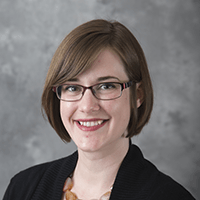There are four exciting TEACHxperts sessions this quarter on topics including using augmented and virtual reality (AR/VR) in education, active learning in the classroom, and experiential learning in digital environments. We can't wait to see you at see at the TEACHxperts sessions this fall!
Fall 2018 TEACHxperts Sessions
VR/AR Experiences in Education: Immersive Computing on Campus
Ariel Rogers & Rebecca Poulson | Northwestern University
Wednesday, October 31 from 12 to 1 p.m.

360-degree videos from CNN can take students to Siberia in the middle of winter, while social virtual reality (VR) applications can allow language learners to attend meet-ups with native speakers. Immersive computing platforms like virtual and augmented reality (AR) offer opportunities for students to engage with complex information in new and different ways. When done well, VR and AR experiences are active, limit distractions, and place the viewer at the center of the story.
Ariel Rogers, assistant professor in RTVF, will discuss how she integrated AR and VR into her class. By partnering with Rebecca Poulson in the Knight Lab, Rogers’s students were able to experience a range of AR and VR technologies. You’ll learn about the specific technologies available at Northwestern and what resources exist to integrate AR/VR into your teaching practice. Benefit from the lessons Rogers and Poulson learned and consider how you might integrate AR/VR technologies into your course, regardless of subject matter.
After hearing from our TEACHxpert speakers, attendees will have an opportunity to experience VR technologies for themselves courtesy of The Knight Lab and Rick Salisbury from Kellogg School of Management. Attendees can also try low-cost headsets that utilize mobile phones and apps.
Making the Move from Lecturing to Active Learning
Ashley M. Purpura | Purdue University
Wednesday, November 14 from 12 to 1 p.m.

Do you wish your large introductory survey course felt more like a small discussion-based seminar? Have you thought about making your class more “active,” but have reservations? This talk presents one instructor’s journey from the lecture hall to an active learning student-centered classroom. As Ashley Purpura of Purdue University candidly discusses her successes and challenges in exploring innovative ways to engage students, she will share some of the motivations, experiences, techniques, and classroom tools involved in adjusting instructional approaches and students’ expectations to an intentionally active classroom dynamic. Attendees will be given the opportunity to reflect on the ways that active learning may relate to their own particular classroom contexts.
Experiential Approaches to Digital Teaching and Learning
Bonnie Stewart | University of Windsor
Friday, November 30 from 12 to 1 p.m.

What does it mean to engage in open professional teaching and learning practices in an era defined by fake news and data surveillance? How can meaningful, mindful digital practices be scaffolded for students and faculty in today’s institutions? This session explores digital teaching and learning as experiential learning and provides an overview of some hands-on experiential paths to building learner-centered, community-oriented approaches to knowledge creation and media navigation.
Workshop: Building Participatory Practices - Experiential Approaches to Digital Teaching and Learning
Bonnie Stewart | University of Windsor
Friday, November 30 from 3 to 4:30 p.m.

What does it mean to engage in open professional teaching and learning practices in an era defined by fake news and data surveillance? How can meaningful, mindful digital practices be scaffolded for students and faculty in today’s institutions? This hands-on workshop explores digital teaching and learning as experiential learning. The session will lead participants through exploring their own digital practices and will frame thinking tools and experiential pathways to problem-solving and building learner-centered digital pedagogies. Focused around participatory practice, this workshop will showcase community-oriented approaches to knowledge creation and media navigation and will model methods for experiential engagement in online and face-to-face contexts.
